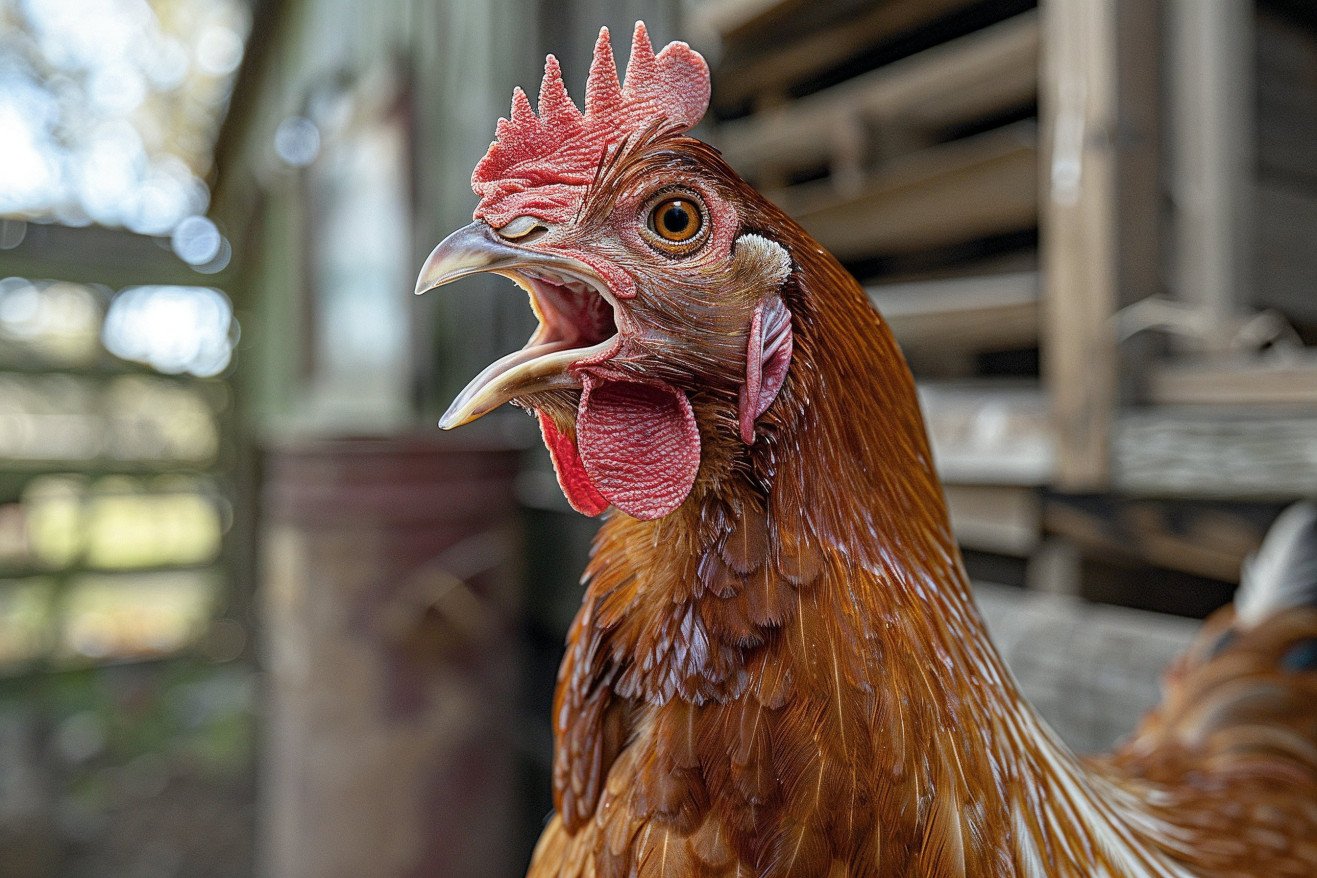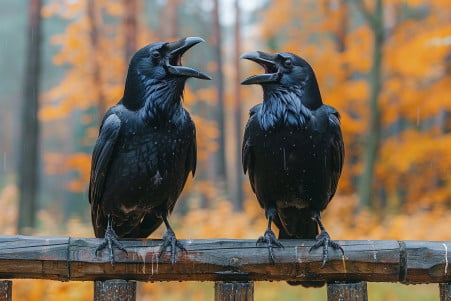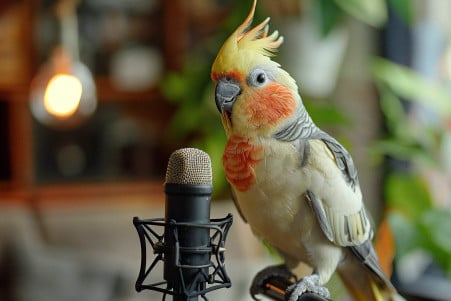Can Female Chickens Crow? The Science of Hen Vocalizations
20 March 2024 • Updated 19 March 2024

While roosters are famous for their crowing, you might not know that hens can also make a crowing sound, although it happens much less often and for different reasons. Hens are most likely to crow after they have laid an egg to let everyone know about their accomplishment, or to protect their nesting area from other hens.
To understand this gender-atypical behavior in chickens, we will look at studies from a number of fields, including poultry science, animal behavior, and evolutionary biology. By doing this interdisciplinary deep dive, you will learn about the physiological, environmental, and evolutionary factors that make it possible and beneficial for hens to occasionally engage in crowing.
Can female chickens crow?
Asserting Dominance: Hens Crowing for Flock Leadership
If there is no rooster in the flock, the alpha hen may start crowing to assert her dominance and let the other hens know that she is the new leader. According to Dine a Chook, crowing is a form of dominance in the henhouse and a way for the alpha hen to maintain her position in the pecking order. This masculine vocalization is often paired with bullying behavior toward the other hens.
As The Frugal Chicken notes, crowing enables the alpha hen to take on the traditional roles of a rooster - protecting the flock, marking territory, and maintaining order. By crowing like a rooster, she is letting the other hens know that she is the new head of the flock.
The alpha hen's crowing lets the other hens know that she is now in charge. Her vocalizations, along with aggressive behavior toward the other hens, help her solidify her position in the pecking order. In the absence of a rooster, the crowing hen takes on the role of the alpha by using her crowing to assert her dominance and bullying the other hens.
Hormonal Imbalances: Spontaneous Sex Reversal in Hens
In extremely rare cases, hens can experience a spontaneous sex reversal, which leads to the development of male physical and behavioral traits. Per Dine a Chook, this happens when the hen's ovary is damaged, which causes a hormonal imbalance and the release of male sex hormones, including testosterone. The result is that the hen will develop larger combs, spurs, and the ability to crow, which is a rooster's signature sound.
The Scientific Reports study notes that mature roosters have larger combs and can crow, while mature hens have smaller combs and don't crow. However, the researchers discovered that the crowing of chicks can be induced by the administration of testosterone over a long period of time.
Dine a Chook estimates that up to 1 in 10,000 hens around the world will experience a sex change in their lifetime. This is a higher number than one might expect given the world's chicken population, which is estimated at around 22.85 billion.
Genetic Predispositions and Breed Differences
Some chicken breeds are more genetically predisposed to hen crowing than others, according to The Featherbrain. In fact, some breeds, such as Longcrower hens, have been bred specifically to encourage hens to exhibit rooster-like vocalizations. Genetic issues or mutations can also cause hormonal imbalances that result in hen crowing, according to the Scientific Reports study.
In addition, as hens get older and their reproductive systems slow down, they may be more likely to crow, says Homesteader Me. This hormonal change can also lead to other changes, such as growing spurs and taking on more dominant behaviors, including crowing to assert their place in the flock. These genetic and age-related factors help explain the many causes of this surprising behavior in female chickens.
Flock Dynamics: Rooster-Less Flocks
In flocks with a rooster, a crowing hen may disrupt the established hierarchy and cause confusion, as Dine a Chook explains. Roosters are important for protecting the flock, finding food, and maintaining order. As the BackYard Chickens forum notes, when a rooster is removed from a flock, it can disrupt the social order and lead to more crowing as hens compete for dominance.
The BackYard Chickens forum also points out that crowing hens may be bullied or attacked by other flock members, including the rooster. This kind of disruption to the social order can lead to unrest and stress within the flock. It’s important to deal with the causes of hen crowing, whether they’re related to dominance or hormones, to restore peace and prevent further disruptions.
How to Deal With Crowing Hens: Tips and Tricks
The BackYard Chickens forum suggests that changing the pecking order by adding new hens or a rooster to the flock can sometimes stop a hen from crowing. The Organic Gardener Magazine Australia also says that temporarily removing the crowing hen from the flock can reset the pecking order and stop the behavior.
As mentioned by Chicken Coops and Tractors Australia, giving hens supplements like kelp can help balance their hormones and reduce their crowing. That said, if the crowing becomes too much of a problem, the Organic Gardener Magazine Australia says that the crowing hen should be removed from the flock to prevent injuries and further disruption.
By using these actionable tips - changing the pecking order, removing the hen, giving supplements, and if necessary, removing the crowing hen from the flock - chicken owners can deal with this surprising behavior and bring peace back to their flock.
Crowing Hens: Harmless Quirk or Potential Health Concern?
Most studies have shown that the act of crowing itself is not harmful to the hen or the flock. One study published in PMC even went so far as to say that crowing is a testosterone-dependent behavior and that the researchers found no evidence of negative effects of hen crowing. However, the causes of crowing, like hormonal imbalances or ovarian issues, may be cause for concern and may need to be addressed by a vet.
Interestingly, a study published in ScienceDirect found that roosters have a passive mechanism to protect their hearing from their own loud crows, but hens lack this adaptation. This means that hens may be at risk for hearing damage if they are exposed to rooster crows for long periods of time. While crowing may not be a concern, the effects of living with roosters that are crowing is an area that needs more research.
Conclusion: Accepting the Crowing Hen
Although hen crowing is rare, it is a natural behavior that can happen for a number of reasons. Knowing the potential causes, including dominance and hormonal imbalances, can help chicken owners take better care of their flocks.
In most cases, hen crowing is nothing to worry about, although any health issues that may be causing it should be treated.
In the end, a crowing hen is a fun oddity that makes a flock more interesting and shows off the many different ways chickens can behave.


